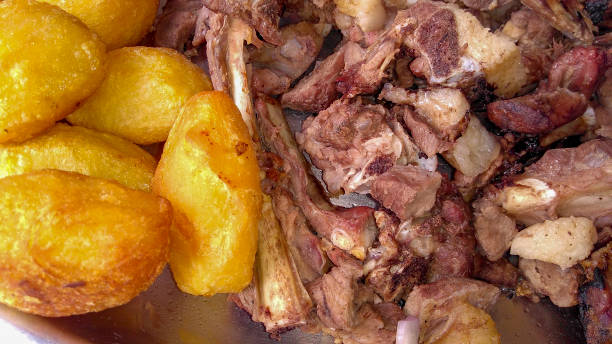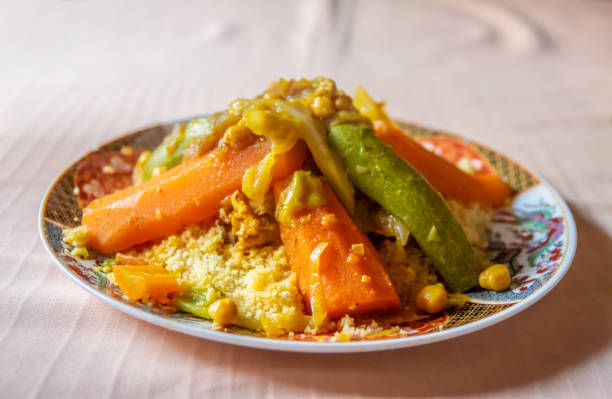Suya, a popular West African street food, especially in Nigeria, is a flavorful and spicy meat skewer typically made from beef, chicken, or goat. Marinated in a unique blend of spices and peanuts before being grilled, suya is not only a culinary delight but also offers several nutritional benefits. This essay explores the nutritional value of suya, highlighting its macronutrient content, vitamins and minerals, and overall health benefits.

Suya is primarily composed of protein and fat, with minimal carbohydrates. The main ingredient, meat, is a rich source of high-quality protein. Protein is essential for building and repairing tissues, supporting immune function, and maintaining muscle mass. A typical serving of suya provides approximately 20-25 grams of protein, making it a substantial contribution to the daily protein requirement.The fat content in suya can vary depending on the cut of meat used. While some cuts may contain higher amounts of fat, it is important to note that not all fats are detrimental to health. Suya often includes healthy fats, especially if lean cuts of meat are used. These fats are important for providing energy, supporting cell growth, and protecting organs.

Suya is a good source of several essential vitamins and minerals. The meat used in suya contains B vitamins, including B6 (pyridoxine), B12 (cobalamin), niacin (B3), and riboflavin (B2). These vitamins play crucial roles in energy metabolism, red blood cell formation, and nervous system function. For example, vitamin B6 is essential for amino acid metabolism and neurotransmitter synthesis, while vitamin B12 is vital for DNA synthesis and maintaining healthy nerve cells.In addition to B vitamins, suya provides essential minerals such as iron, zinc, phosphorus, and selenium. Iron is necessary for oxygen transport in the blood and energy production, while phosphorus is important for bone health and cellular function. Zinc supports immune function, wound healing, and DNA synthesis. Selenium, an antioxidant, helps protect cells from oxidative damage and supports thyroid function.

The meat used in suya is a complete protein, meaning it contains all nine essential amino acids that the body cannot produce on its own. These amino acids are crucial for various bodily functions, including muscle growth, tissue repair, and enzyme production. The presence of these essential amino acids makes suya a valuable source of high-quality protein, particularly important for individuals looking to maintain or build muscle mass.
Consuming suya in moderation can provide several health benefits. The high protein content supports muscle maintenance and repair, making it a suitable choice for active individuals and those looking to increase their protein intake. The healthy fats present in suya, particularly if lean meat is used, contribute to cardiovascular health by providing essential fatty acids that are beneficial for heart health.Moreover, the vitamins and minerals found in suya play vital roles in maintaining overall health. For instance, the B vitamins support energy production and brain function, while minerals like iron and zinc boost the immune system and promote healthy blood circulation.The spices used in the suya marinade, such as ginger, garlic, and chili peppers, offer additional health benefits. These spices contain antioxidants and anti-inflammatory compounds that can help protect the body against chronic diseases and support overall health.

Beyond its nutritional value, suya holds significant cultural and social importance in West African cuisine. It is often enjoyed as a street food, bringing communities together to share in the experience of cooking and eating. The preparation of suya is considered an art, with each vendor and region having its unique recipe and method. This communal aspect enhances the enjoyment of the meal and promotes a sense of connection and tradition.
While suya offers numerous nutritional benefits, it is also important to consider its caloric content. Depending on the cut of meat and the amount of oil used in preparation, a serving of suya can range from 200 to 400 calories. Therefore, moderation is key when consuming suya, especially for individuals who are managing their calorie intake or following a weight loss plan.

Suya is not only a flavorful and iconic dish in West African cuisine but also a nutritionally rich food that offers a variety of health benefits. Its high-quality protein content, essential vitamins, and minerals make it a valuable addition to a balanced diet. While it is important to consume suya in moderation due to its caloric density, incorporating it occasionally can provide a delightful and nutritious experience. By savoring suya, one can enjoy a taste of West African culinary heritage while reaping the benefits of its rich nutritional profile.





Thanks for the insightful breakdown! It’s clear how platforms like AI Tool simplify the hunt for reliable AI solutions. The curation really helps avoid endless scrolling.
Howdy! I’m at work browsing your blog from my new iphone!
Just wanted to say I love reading your blog and look
forward to all your posts! Carry on the excellent work!
Wonderful items from you, man. I’ve bear in mind your stuff previous to
and you’re simply too excellent. I really like what you’ve bought
here, really like what you’re saying and the way in which
wherein you assert it. You’re making it enjoyable
and you continue to take care of to stay it smart.
I can not wait to learn much more from you. This is actually a terrific website.